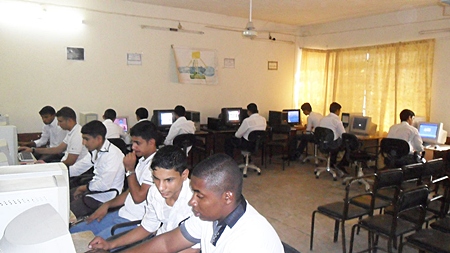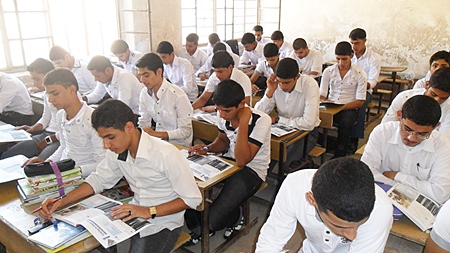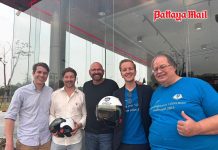With more international students studying at Asian University, contributions to the local community have now reached an international level. In addition to contributing to the development of the local community around Asian University, international students are applying their international learning experience at Asian University to actively contribute to development of education in their home countries.
One of these students is Ahmed Falih Rabeea, an Iraqi secondary school English teacher from Basra in southern Iraq. Ahmed joined the Master of Education programme in Teaching English to Speakers of Other Languages (TESOL) last year with the goal of applying his learning experience to contribute to the educational system in his hometown. As part of his thesis he has started a project to introduce the use of E-learning at local schools in the south of Iraq.
 The best learning results come up when students share a computer, instead of working alone.
The best learning results come up when students share a computer, instead of working alone.
During his studies on the M.Ed. TESOL programme Ahmed was introduced to the principles of E-learning in English language education and decided to explore the opportunities for a pilot project in Iraq. This proved to be easier said than done in a country in which education suffered from two decades of war. Innovations in education such as E-learning are a rarity in Iraq. However, with limited internet access and only a couple of hours of electricity a day, Ahmed decided to take up the challenge. In order to run the experiment successfully he rented 20 computers and two generators to power the computers during the practicum.
His experiment aims at investigating the effect of interactive learning materials on students’ English language proficiency levels. One group of students is now receiving 2 hours of interactive computer-based instruction per week and 2 hours of normal textbook-based instruction. Another group is following the standard programme of four hours of textbook-based classes a week without the interactive learning materials.
 This is how a normal learning environment looks like in Iraq.
This is how a normal learning environment looks like in Iraq.
The first results are hopeful and showed zero absentees during the first 8 weeks of instruction, a much more positive attitude toward learning English and more motivated students.
Ahmed said, “Some shy students told me that they learn English with much more confidence and excitement than before. As to the school teachers, they expressed their admiration to see that the Basra Education Directorate and the school administration have paid much more attention to this development and lend support to this project. They would like to adopt such a method in their way of teaching.”
The final results will be expected in late December when he finishes his experiment.




